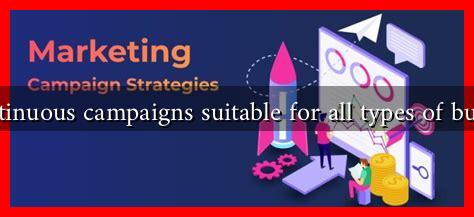-
Table of Contents
- Are Continuous Campaigns Suitable for All Types of Businesses?
- Understanding Continuous Campaigns
- Benefits of Continuous Campaigns
- Challenges of Continuous Campaigns
- Are Continuous Campaigns Suitable for All Businesses?
- 1. Industry Type
- 2. Target Audience
- 3. Marketing Objectives
- Case Studies and Examples
- Conclusion
Are Continuous Campaigns Suitable for All Types of Businesses?
In the ever-evolving landscape of marketing, businesses are constantly seeking effective strategies to engage their audience and drive sales. One approach that has gained traction in recent years is the concept of continuous campaigns. But are these campaigns suitable for all types of businesses? This article delves into the nuances of continuous campaigns, exploring their benefits, challenges, and the types of businesses that can effectively implement them.
Understanding Continuous Campaigns
Continuous campaigns are marketing efforts that run indefinitely, rather than being confined to a specific timeframe. They are designed to maintain a consistent presence in the market, allowing businesses to engage with their audience continuously. This approach contrasts with traditional campaigns, which often have a defined start and end date.
Benefits of Continuous Campaigns
Continuous campaigns offer several advantages that can be beneficial for various types of businesses:
- Brand Awareness: By maintaining a constant presence, businesses can enhance brand recognition and recall among consumers.
- Customer Engagement: Continuous campaigns allow for ongoing interaction with customers, fostering loyalty and community.
- Data Collection: Running campaigns over an extended period enables businesses to gather valuable data on customer preferences and behaviors.
- Flexibility: Continuous campaigns can be adjusted based on real-time feedback and market trends, allowing for more agile marketing strategies.
Challenges of Continuous Campaigns
While continuous campaigns have their benefits, they also come with challenges that businesses must consider:
- Resource Intensive: Maintaining a continuous campaign requires ongoing investment in time, money, and human resources.
- Content Fatigue: Audiences may become desensitized to messages if they are not varied or engaging enough.
- Measurement Difficulties: Evaluating the effectiveness of a continuous campaign can be more complex than measuring the success of a time-limited campaign.
Are Continuous Campaigns Suitable for All Businesses?
The suitability of continuous campaigns largely depends on the nature of the business, its target audience, and its marketing objectives. Here are some factors to consider:
1. Industry Type
Some industries are more conducive to continuous campaigns than others. For example:
- Consumer Goods: Brands like Coca-Cola and Procter & Gamble often run continuous campaigns to maintain brand visibility.
- Seasonal Businesses: Companies that rely on seasonal sales may find continuous campaigns less effective, as their marketing efforts need to align with specific times of the year.
2. Target Audience
Understanding the target audience is crucial. Continuous campaigns may work well for businesses targeting younger demographics who are more engaged with digital platforms. For instance, brands like Nike leverage continuous campaigns on social media to connect with their audience consistently.
3. Marketing Objectives
If a business aims to build long-term relationships with customers, continuous campaigns can be highly effective. However, if the goal is to drive immediate sales or promote a specific event, a traditional campaign may be more appropriate.
Case Studies and Examples
Several companies have successfully implemented continuous campaigns:
- Red Bull: The energy drink company has built a brand around continuous engagement through extreme sports events and content marketing, creating a lifestyle brand rather than just a product.
- Amazon: With its Prime membership, Amazon runs continuous campaigns that promote various benefits, keeping customers engaged year-round.
Conclusion
In conclusion, while continuous campaigns offer numerous benefits, they are not a one-size-fits-all solution. Businesses must carefully evaluate their industry, target audience, and marketing objectives before committing to this approach. Continuous campaigns can be a powerful tool for building brand awareness and customer loyalty, but they require careful planning and execution to avoid pitfalls such as content fatigue and resource strain. Ultimately, the key to success lies in finding the right balance between continuous engagement and targeted, time-limited campaigns.
For more insights on effective marketing strategies, consider exploring resources from HubSpot.

